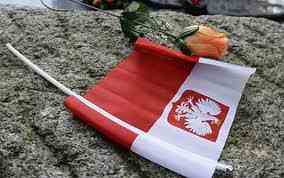 |
| Commonwealth War Graves at Poznań Old Cemetery |
It was, I amid, with some surprise that I noticed a sign to Poznan Old Garrison Cemetery with the subscipt : British Commonwealth Section (1), while driving through Poznan a year or two back. Alas, as with many things in life, my initial intrigue was overtaken by other things and it was only when I noticed a similar sign on the road to Gdansk the other day that I decided to check it out on-line.
(1) Yes I know this is an outdated name and politicly incorrect, but then again most people in Poland are still strugling with the Bombay/Mumbai thing.
When you go on the Commonwealth War Graves Commission webiste you are told this about the Poznan cemetery:
After the First World War, the graves of Commonwealth servicemen who had died in Poland as prisoners of war were gathered together in this cemetery. There are now 174 Commonwealth servicemen of the First World War buried or commemorated in the cemetery. One of the burials is unidentified. Special memorials commemorate one casualty known to have been buried in Czersk Prisoners of War Cemetery, 29 known to have been buried at Szczypiorno Prisoners of War Cemetery and 18 known to have been buried at Pila (formerly Schneidemuhl) Prisoners of War Cemetery, all of whose graves could not be identified. The majority of the 283 Second World War burials in the cemetery are those of airmen, many of whom died in bombing operations on Stettin (now Szeczin). Also buried here are those involved in the mass escape from Stalag Luft 3, Sagan (now Zagan), in March 1944, and others who died while prisoners of war during the German occupation, at Stalag VIIIC, Sagan, Stalag XXID at Poznan, Oflag XXIB (also known as Oflag 64) and Stalag XXIB, both at Schubin (now Szubin). There are also 19 war graves of other nationalities in the cemetery, most of them Polish. The cemetery also contains the POZNAN MEMORIAL commemorating five RNAS armoured car ratings who died near Brezazany in July 1917 and whose graves were never located.
Grave of Lithuanian RAF Pilot
To be honest, until coming to Poland and in fact living here, I did not know much about Poland's First or Second World War history. Everyone of course knows the big stuff such as the Sept. '39 invasion and Britain and France's declaration of war etc... But beyond that most west European's knowledge of Poland's war is limited to the odd character in an otherwise overly British/American war film.
Perhaps its know different, with more east European influnce on the film indusry. But that was definetly the case for anyone who grew up watching repeats of sixties war films :)
This faliure of west Europeans to understand the wars in east Europe is of course indicative of the post-war devide. It is a cruel irony that the so called 'free' west knew actually far less about their European brethren than their eastern counterparts. Growing up in Communist Poland, often meant a thirst for all things western, while those in the west had little interest in all things eastern.
In many ways this was of course encouraged by official government policy: after the war the government wanted to make sure awkward issues of Polish occupation and betrayal were kept out of the general public's attention. It is only in recent years that this subject has been revisted, as illustrated by the resent visit of Polish Foriegn Minister, Radosław Sikorski to the RAF Museum's new exhibit on foreign fighter pilots in the Battle of Britain.





























